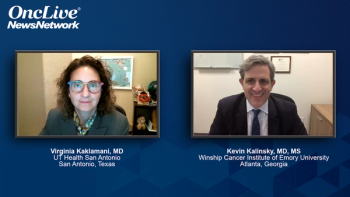Emerging Treatment Approaches for HR+/HER2– Early-Stage Breast Cancer

Panelists discuss how HR+/HER2– early-stage breast cancer (eBC) is characterized by hormone receptor–positive, HER2-negative tumors, focusing on unmet patient needs, the goals of treatment in this setting, and the critical timing for discussing recurrence risk with patients.

Panelists discuss how the NCCN guidelines for risk stratification in HR+/HER2– early-stage breast cancer (eBC) guide clinical decision-making, exploring real-world adherence to these guidelines, the complexity of risk stratification in various clinical scenarios, and the role of clinical factors, biomarkers, and advanced testing methodologies (including RSClin N+, next-generation sequencing [NGS], fluorescence in situ hybridization [FISH], immunohistochemistry [IHC], and circulating DNA [ctDNA]) in defining “high-risk” patients and guiding treatment strategies.

Panelists discuss how the NCCN guidelines for risk stratification in HR+/HER2– early-stage breast cancer (eBC) guide clinical decision-making, exploring real-world adherence to these guidelines, the complexity of risk stratification in various clinical scenarios, and the role of clinical factors, biomarkers, and advanced testing methodologies (including RSClin N+, next-generation sequencing [NGS], fluorescence in situ hybridization [FISH], immunohistochemistry [IHC], and circulating DNA [ctDNA]) in defining “high-risk” patients and guiding treatment strategies.

Panelists discuss how the NCCN guidelines for risk stratification in HR+/HER2– early-stage breast cancer (eBC) guide clinical decision-making, exploring real-world adherence to these guidelines, the complexity of risk stratification in various clinical scenarios, and the role of clinical factors, biomarkers, and advanced testing methodologies (including RSClin N+, next-generation sequencing [NGS], fluorescence in situ hybridization [FISH], immunohistochemistry [IHC], and circulating DNA [ctDNA]) in defining “high-risk” patients and guiding treatment strategies.

Panelists discuss how differences in trial designs, including inclusion criteria, dosing, and end points, influence clinical decision-making in the use of CDK4/6 inhibitors for HR+/HER2– early breast cancer (eBC), with a focus on the NATALEE trial’s analysis of patients with no or low nodal involvement, and how recent expanded approval of ribociclib for high-risk node-positive and node-negative eBC patients guides the identification of ideal candidates based on clinical factors.

Panelists discuss how common adverse events (AEs) with CDK4/6 inhibitors in HR+/HER2- early breast cancer (eBC) vary based on treatment and patient population, with strategies for mitigating toxicities, adjusting dosing, and monitoring labs to ensure treatment continuation; they also address approaches to dose reductions, promoting treatment adherence, educating patients about toxicity management, and balancing efficacy, quality of life, and side effect risks, particularly for high-risk patients with no or low nodal involvement.

Panelists discuss their approach to sequencing surgery, radiation, and systemic therapies for early-stage breast cancer patients, emphasizing the guiding principles of treatment sequencing and how individual patient factors influence decisions; they also highlight the importance of multidisciplinary coordination, identifying key specialists, ensuring alignment on diagnosis, risk assessment, and treatment goals, and the critical role of including the patient in these discussions.

Panelists discuss key updates from the past year regarding HR+/HER2– early breast cancer (eBC), emerging research that could transform treatment approaches, and the role of new biomarkers in patient identification, stratification, and predicting CDK4/6 inhibitor responses; they also highlight studies on the horizon that may further refine treatment strategies and offer closing clinical pearls for diagnosing and managing early-stage breast cancer.


